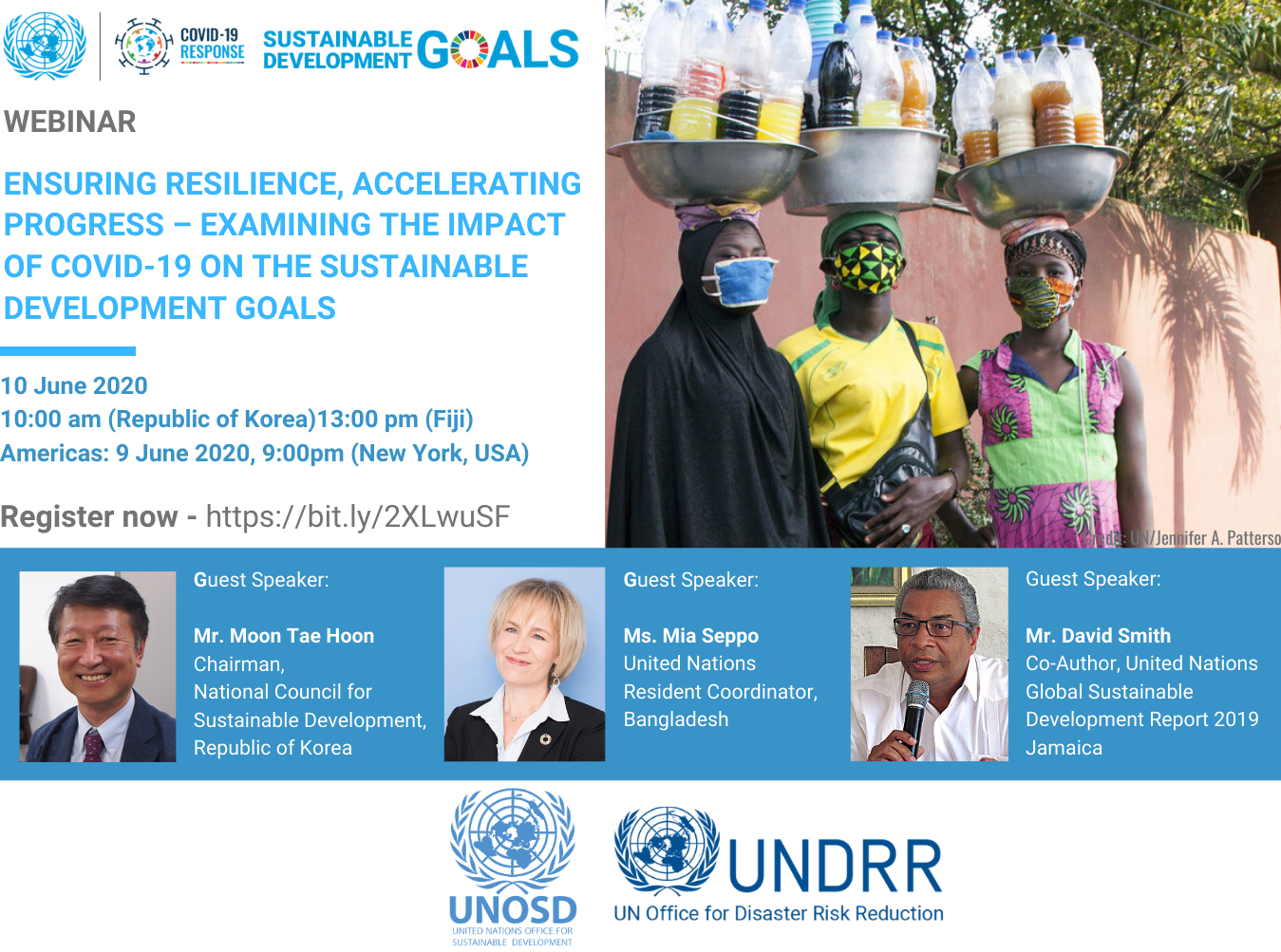Webinar: Ensuring Resilience, Accelerating Progress – Examining the Impact of COVID-19 on the Sustainable Development Goals

Overview
Ensuring Resilience, Accelerating Progress - Examining the Impact of COVID-19 on the Sustainable Development Goals
Documents and Readings
CONCEPT NOTE (updated as of 10 June 2020)
SPEAKER BIOGRAPHY (updated as of 8 June 2020)
WEBINAR REPORT (updated as of 4 August 2020)
A UN framework for the immediate socio-economic response to COVID-19
UNDRR page on Developing National Disaster Risk Reduction Strategies
High-level Event on Financing for Development in the Era of COVID-19 and Beyond
Background
The year 2020 marks the 75th anniversary of the United Nations while the world enters an unprecedented global crisis with severe impacts across the 2030 Agenda for Sustainable Development and its 17 Sustainable Development Goals. With ten years remaining to achieve the 2030 Agenda in this Decade of Action, the COVID-19 pandemic compels a dual focus on ensuring a resilient recovery and accelerating progress on the Sustainable Development Goals (SDGs).
Today, more than ever, a focus must be placed on realizing synergies and investing in a recovery that will ‘build back better”. Member States must take stock of the impacts that the current global pandemic is having across the SDGs, particularly from national to local levels, and adopt disaster risk reduction strategies that address all hazards - including biological, with integrated risk governance systems . The Covid-19 pandemic is evidence that risk is systemic. In addition, further discussion is needed to identify the differentiated impacts the pandemic is having on the most vulnerable populations by exacerbating poverty, hunger, malnutrition, inequalities, exclusion, violence, and discrimination.
Current ministerial (HLPF Ministerial Declaration 2020) preparations for the High-Level Political Forum on Sustainable Development (HLPF) reaffirm the 2030 Agenda’s role as our ‘first line of defence against COVID-19’. The impacts from the pandemic are fast evolving and cut across the SDGs, underscoring the need for an “SDG-sensitive response to COVID-19 and rebuilding better to deliver on the Decade of Action”.
The urgency for action is now two-fold: to protect development gains and to accelerate action to achieve the SDGs by 2030. We need to take accelerated action for SDG targets on human well-being, as well as biodiversity, disaster risk reduction, and climate change, through coherent, coordinated and risk-informed responses. Furthermore, 2020 is expected to be one of the warmest years on record, underscoring the continued challenges that climate change brings in combination with the global pandemic, the UN Secretary-General announced six climate actions to shape a more resilient recovery from COVID-19, which should guide recovery efforts.
We should seize the opportunity to “build back better” by creating more sustainable, resilient and inclusive societies. With this in mind, the United Nations Office for Sustainable Development (UNOSD) and the United Nations Office for Disaster Risk Reduction (UNDRR) through its Global Education and Training Institute are organizing a webinar to engage national SDG focal points and coordinating agencies, along with national focal points of the Sendai Framework for Disaster Risk Reduction in a dialogue on how national governments are assessing the impact of the pandemic on key SDGs.
The UN has recognized country responses that are combining the pandemic response and recovery efforts that simultaneously address climate change like that of the Republic of Korea. These national responses are showing that combating the novel coronavirus can be coupled with an environmentally friendly, socially inclusive economic recovery.
Organizers

This webinar is co-organized by the United Nations Office for Disaster Risk Reduction - Office in Incheon for Northeast Asia and Global Education and Training Institute for Disaster Risk Reduction, the United Nations Office for Sustainable Development of the United Nations Department of Economic and Social Affairs
Objectives and Content
The webinar will examine how national responses are reducing the impacts of COVID-19, especially socio-economic impacts, to sustain the gains realized on the 2030 Agenda. It will also showcase how national responses can achieve synergies to accelerate a resilient recovery for the SDGs in the Decade of Action.
The webinar will discuss the road ahead to 2030 and how current government responses can integrate disaster risk reduction measures that respond to double or triple challenges many now face as a result of climate change and COVID-19 socio-economic impacts.
Target audience:
This webinar aims to engage national SDG focal point institutions across the UN Member States, as well as national government focal points of the Sendai Framework for Disaster Risk Reduction. The webinar will also be open to government representatives and non-government experts working in the areas of SDG implementation, resilience, and climate change to ensure a coherent and integrated discussion on the SDGs and the Decade of Action.
Opening
- Mr. Jean D’Aragon, Officer in Charge, UN Office for Sustainable Development, UN DESA
Speakers
- Mr. Moon Tae Hoon, Chairman, National Council for Sustainable Development, Republic of Korea
- Ms. Mia Seppo, UN Resident Coordinator, Bangladesh
- Mr. David Smith, Co-Author, United Nations Global Sustainable Development Report 2019 / Professor, University of the West Indies
*The recordings of the webinar can be found on: https://www.undrr.org/event/webinar-ensuring-resilience-accelerating-progress-examining-impact-covid-19-sustainable
Moderator
- Mr. Sanjaya Bhatia, Head, UNDRR Office for Northeast Asia (ONEA) & Global Education and Training Institute (GETI)
For more information:
Ana Cristina Thorlund, UNDRR Global Education and Training Institute (GETI) at undrr-incheon@un.org
Sara Castro Hallgren, UNOSD, UN DESA at sara.castrohallgren@un.org
Disclaimer:
For the purpose of this event, UNDRR procures the services of Zoom Video Communications, Inc., an external service provider. Registration for this webinar is supported by the Zoom registration mechanism and does not imply the expression of any opinion whatsoever on the part of the Secretariat of the United Nations concerning the legal status of any country, territory, city or area or of its authorities

